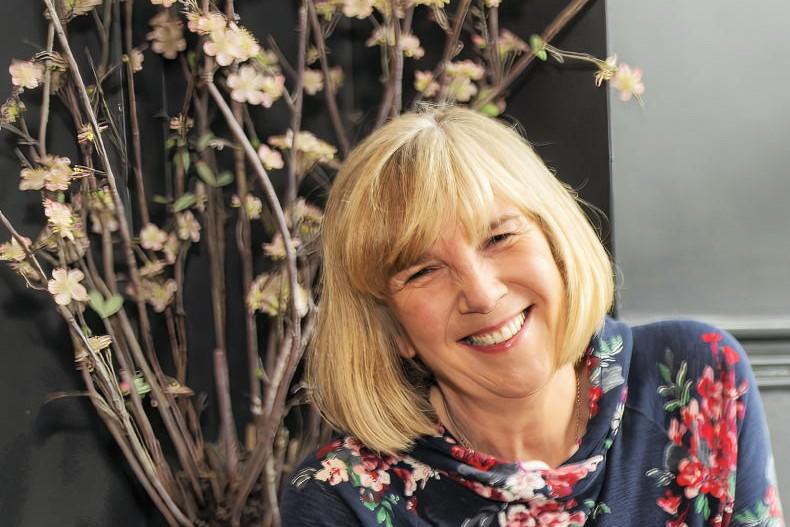I grew up on a farm just north of Dunshaughlin, Co Meath. Before I even went to school my eldest sister Teresa taught me to read fully. I’ve loved books ever since; absolutely from when I was about four I’ve loved books.
By the time I got to 11 or 12, I had started writing to the letter pages in women’s magazines. I would never get the Star Letter, because I was too young, but you’d get a few bob maybe.
There was a section in one of the magazines about useful hints around the home. My mother was a great homemaker, so I’d say, “Mam, can you tell me how to clean such and such a stain without using a commercial product?” She was great with all that, she’d use everything, soot, you name it. So I’d write into that too.
I also used to write into a radio programme on RTÉ called Dear Sir or Madam. All that gave me a push. Then over the years I started to write bits of stories. I did the Leaving Cert, I went to university and I became a professional social worker.
Injury
In 1992, the year I got married, I had a very bad fall. Apart from writing, I love to paint and draw and I love photography. I was out here on our own land. There’s a steep drop in a bank between our farm and the next, it’s filled-in since thank God.
It was early March and I was trying to photograph primroses, I loved them. It was an old SLR camera. Down I went, head first into the dyke. I got a spinal injury out of it. I’ll never forget it.
I went to a doctor and I was told all that was wrong with me was pre-wedding nerves. I was going around for nine months with a very badly herniated disc in my cervical spine, and I got married in the middle of it.
At this stage I couldn’t lift my arms and at night in bed I’d have shooting pain. Touch wood, I never experienced pain like that again. I ended up going to a neurosurgeon. He sent me for an MRI and a week after I had surgery.
For about three years after that I was in horrendous pain because I had to recover. I had my daughter Olivia in the middle of it. She’s in her 20s now. She was like a gift from heaven.
I had to give up my job as a social worker, because they told me to modify my lifestyle. I couldn’t work with that level of high pain. Then I started to look after my dad here- I inherited his farm and I still live on it. I was also doing courses in university. I studied history and folklore.
Books
I started writing again then and I got into Sunday Miscellany on RTÉ with a historical piece I did. Then I started writing short stories for magazines, but I wasn’t getting paid.
I write because I love to write, it wasn’t about the few bob you’d get paid. My father was a seanchaí in his own right. I must have internalised some of his love for storytelling. I told stories to my own daughter when she was growing up.
Then I said, I’m going to write these books. I used the last few years, especially the time of COVID-19, to write two novels. That’s when I really said, I’m going to publish these novels.
In 2021, I published two books. The first one is called Reapers of Justice. That’s set during the Irish War of Independence.
Really, what I set out to do in that was to look at ordinary women doing extraordinary things and just get away from always having the male narrative with regard to the War of Independence. We’ve heard that for so long and I respect it, but I felt I wanted to look at it from a slightly different angle.
When Silence Hurts, my second novel, I suppose in a way that might be slightly more controversial.
This time I’m looking at the topic of control. What inspired this novel was during COVID-19 every time I turned on the radio, you’d hear about the increase in calls to refuge centres for women. The women’s domestic abuse lines were up significantly.
It was a story that wouldn’t go away from my head. I could imagine people being locked up during COVID-19 with some husband or partner who was totally obnoxious and physically and sexually violent as well.
When I was researching this novel, I knew it but I had to confirm it, that marital rape was only made a crime in Ireland in 1990.
I set out to set the novel in more modern days, but when I confirmed that, I couldn’t, because I had to take cognisance of that fact; that if you were raped in marriage before that, you had no voice. That horrified me.
The themes of both novels are as relevant and pertinent today as they were 100 years ago. That’s what’s extraordinary, it’s proven what was always said about Shakespeare’s plays, that the themes are timeless.
I’ve a new novel coming out and it’ll be set in Ireland during World War II. I love writing, be it fiction or non-fiction. It’s a passion.
Read more
‘If a tractor is passing this minute, I’ll go out to look at it’
My Country Living: A farm with a public walk in the Burren
I grew up on a farm just north of Dunshaughlin, Co Meath. Before I even went to school my eldest sister Teresa taught me to read fully. I’ve loved books ever since; absolutely from when I was about four I’ve loved books.
By the time I got to 11 or 12, I had started writing to the letter pages in women’s magazines. I would never get the Star Letter, because I was too young, but you’d get a few bob maybe.
There was a section in one of the magazines about useful hints around the home. My mother was a great homemaker, so I’d say, “Mam, can you tell me how to clean such and such a stain without using a commercial product?” She was great with all that, she’d use everything, soot, you name it. So I’d write into that too.
I also used to write into a radio programme on RTÉ called Dear Sir or Madam. All that gave me a push. Then over the years I started to write bits of stories. I did the Leaving Cert, I went to university and I became a professional social worker.
Injury
In 1992, the year I got married, I had a very bad fall. Apart from writing, I love to paint and draw and I love photography. I was out here on our own land. There’s a steep drop in a bank between our farm and the next, it’s filled-in since thank God.
It was early March and I was trying to photograph primroses, I loved them. It was an old SLR camera. Down I went, head first into the dyke. I got a spinal injury out of it. I’ll never forget it.
I went to a doctor and I was told all that was wrong with me was pre-wedding nerves. I was going around for nine months with a very badly herniated disc in my cervical spine, and I got married in the middle of it.
At this stage I couldn’t lift my arms and at night in bed I’d have shooting pain. Touch wood, I never experienced pain like that again. I ended up going to a neurosurgeon. He sent me for an MRI and a week after I had surgery.
For about three years after that I was in horrendous pain because I had to recover. I had my daughter Olivia in the middle of it. She’s in her 20s now. She was like a gift from heaven.
I had to give up my job as a social worker, because they told me to modify my lifestyle. I couldn’t work with that level of high pain. Then I started to look after my dad here- I inherited his farm and I still live on it. I was also doing courses in university. I studied history and folklore.
Books
I started writing again then and I got into Sunday Miscellany on RTÉ with a historical piece I did. Then I started writing short stories for magazines, but I wasn’t getting paid.
I write because I love to write, it wasn’t about the few bob you’d get paid. My father was a seanchaí in his own right. I must have internalised some of his love for storytelling. I told stories to my own daughter when she was growing up.
Then I said, I’m going to write these books. I used the last few years, especially the time of COVID-19, to write two novels. That’s when I really said, I’m going to publish these novels.
In 2021, I published two books. The first one is called Reapers of Justice. That’s set during the Irish War of Independence.
Really, what I set out to do in that was to look at ordinary women doing extraordinary things and just get away from always having the male narrative with regard to the War of Independence. We’ve heard that for so long and I respect it, but I felt I wanted to look at it from a slightly different angle.
When Silence Hurts, my second novel, I suppose in a way that might be slightly more controversial.
This time I’m looking at the topic of control. What inspired this novel was during COVID-19 every time I turned on the radio, you’d hear about the increase in calls to refuge centres for women. The women’s domestic abuse lines were up significantly.
It was a story that wouldn’t go away from my head. I could imagine people being locked up during COVID-19 with some husband or partner who was totally obnoxious and physically and sexually violent as well.
When I was researching this novel, I knew it but I had to confirm it, that marital rape was only made a crime in Ireland in 1990.
I set out to set the novel in more modern days, but when I confirmed that, I couldn’t, because I had to take cognisance of that fact; that if you were raped in marriage before that, you had no voice. That horrified me.
The themes of both novels are as relevant and pertinent today as they were 100 years ago. That’s what’s extraordinary, it’s proven what was always said about Shakespeare’s plays, that the themes are timeless.
I’ve a new novel coming out and it’ll be set in Ireland during World War II. I love writing, be it fiction or non-fiction. It’s a passion.
Read more
‘If a tractor is passing this minute, I’ll go out to look at it’
My Country Living: A farm with a public walk in the Burren








SHARING OPTIONS